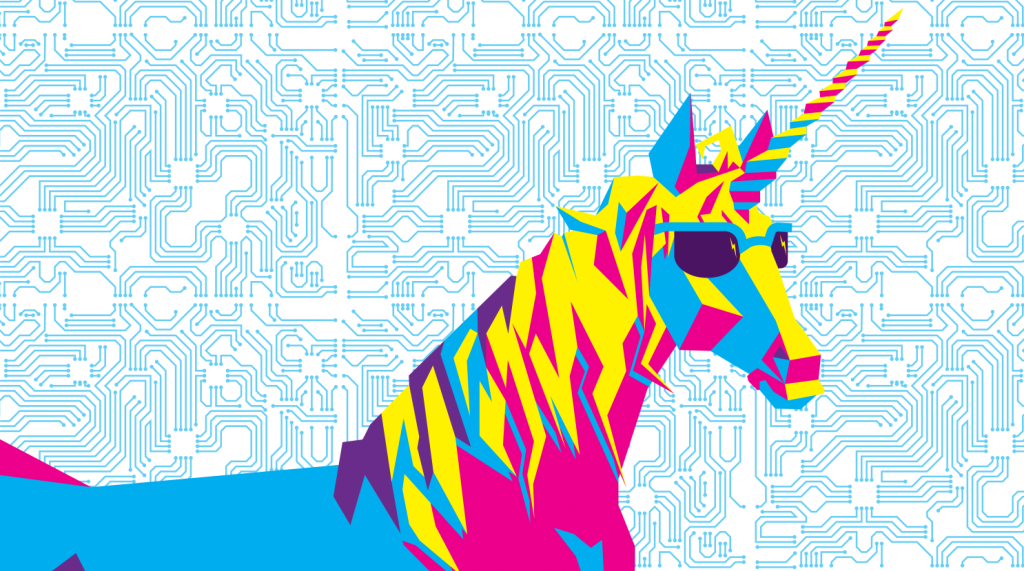In this month of June 2020, as the issue of sovereignty is on everyone’s mind, let us look back on 3rd October 2019, when the French government’s inquiry committee on digital sovereignty chaired by Bruno Retailleau presented its findings to the Senate.
In essence, after 70 hours of hearings involving government members, scientists, top state officials, regulatory authorities and businesses, the committee’s conclusions were (you can find all the details here):
- Tech giants are too big for any healthy competition to prosper,
- France and Europe are struggling to develop unicorns to counter these giants,
- We have to be more diligent and encourage innovation.
Encouraging innovation means promoting and financing the rise of national technological nuggets and unicorns – out of 392 unicorns on record in July 2019, only 5 were French. That’s not great to say the least.
The committee’s report is peppered with all the start-up/tech lingo that typically has the hallways of the Las Vegas CES and “digital natives” buzzing – IA, blockchain, connected fridges, quantic computers and the like…
So, is our digital sovereignty really dependent on a strange beast that doesn’t exist yet? What does the future hold for all the companies whose purpose isn’t to become this disruptive media-hyped animal but simply to provide a sensible, sovereign and more rounded offering? What can you hope for when, like BlueMind, you can say “We’re no unicorn”?
.
Fantastic beasts
A “unicorn” is a start-up company valued at over a billion dollars that has experienced hyper-growth in a new or evolving market. The venture capital investment model is built on the premise of investing in multiple high-tech companies in the hope that one of them will turn into a unicorn. Even though they are rare (hence the name), finding one unicorn will more than make up for the investments that don’t pan out.
Becoming a unicorn has therefore become the paragon of success throughout the world and a goal for both businesses and States (as we can see the French Senate committee report that would like to see legions of unicorn stables). And yet… if less than 0.01% of start-ups make it, what about the other 99.99%? Beyond the rainbows and the glitter, does the unicorn model really make sense?

.
Is something rotten in Unicornland?
Firstly, the quest for unicorns tends to imply that a company’s value is exclusively measured by its market capitalisation. This is overly simplistic as it overlooks many variables – social impact, economic impact, environmental impact, innovation capacity, the issue(s) it resolves (or causes), sustainability, etc.
Call us idealists, but there are some very specific examples where these considerations take centre stage. The most telling is Uber. The US unicorn boasts the highest valuation of all despite it losing money consistently — even before the pandemic — and, more importantly, it is based on a highly controversial labour organisation model: “Uberisation” – which clearly raises the issue of the kind of social, economic and legal model we want.
As for sustainability, the WeWork saga is just as full of new developments and cliff-hangers as any good Netflix fiction. As a matter of fact, AppleTV is planning to turn it into a series – people just love to watch a unicorn go out with a bang. There are other examples of overvaluation (BirchBox, Lyft, Trivago, etc.). Not all of them go down in flames but these cases do highlight the unpredictability of market value as a sole criterion.
So, what do we really mean by fostering a European champion? Do we just huff and puff at the GAFAM? How about we think in terms of model of society rather than in terms of market value? Can digital sovereignty only be achieved by compromising on society values and by replicating an imported model that’s irrelevant to us?
.
Over the rainbow

It is important to note that the buzzwords that pepper the Senate committee’s report and politicians’ discourse as well as general public tech events are not what makes up today’s digital sphere. Blockchain is struggling to find its model, AI continues to be more artificial than intelligent, and the quantum computer doesn’t even exist. The robot apocalypse isn’t coming. Not today, not tomorrow. Technological singularity isn’t coming either.
The media’s disruption race is symptomatic. Is our society so flawed that we should systematically tear everything down? Is disruption really all but proof of our inability to build a future properly and incrementally while accommodating actual constraints?
The European digital sphere is a treasure trove of advanced know-how that thrives through down-to-earth companies that respond to tangible, specific needs.
Take email, for instance.
It is amusing how people might have lively watercooler conversations about new, revolutionary technologies and then go back to their desk and… open their email.
Email is the tool company employees use most on a daily basis, and people use it to identify themselves absolutely everywhere on the internet (and elsewhere). A business cannot lose it capacity to send and receive emails even for just half a day. Contrary to appearances, the expertise required to develop a professional, collaborative email solution is unique, advanced and acquired over the long term. In Europe, only BlueMind, a French company, fully enjoys this expertise – having mastered and implemented multiple protocols, functional and technical components and the types of access and synchronisation layers that make up a solution. This has given fruit to an “off-the-shelf”, industrialised, packaged and scalable product that meets market requirements, with over 500 clients of all industries and sizes.
BlueMind’s ethos isn’t the typical GAFAM-like “winner takes all” but “#TheChoiceIsHere” – the choice of email, the choice to change, to choice of model of society. The model we, at BlueMind, want is based on open source, co-construction, digital wholesomeness and strong ecosystems along with being a solid, specialist software publisher.
We’re not so worried about stories of robot unicorns bred on a futuristic blockchain whose clients never talk to us. We believe that Europe is teeming with companies and individuals whose unique, state-of-the-art expertise respond to a real market need. Rather than search for a European giant that will defend our region’s honour clad in a glittery suit on the world’s digital fighting ring, let’s focus on more humble champions who already make a difference today.
.
Schrödinger’s unicorn
Since lockdown, the GAFAM and other American giants are rubbing their hands together. “Let’s Zoom” is the new “I’m going to Google this” – which incidentally has prompted Microsoft into flooding internet ad space with its “Teams”. No one even blinks and yet everyone is shocked that the Stop-COVID app might feed information to the American proverbial ogre without our consent. Just like Zoom did with Facebook.
Companies, administrations and States alike continue to take offence at the practices of US tech firms and yet choose them anyway, including for critical and strategic data. A noteworthy example is France’s health data hosting contract (Health Data Hub) being awarded to Microsoft. Both in terms of form and content, handing out the country’s most comprehensive and detailed health database – tomorrow’s black gold, a generator of jobs and technologies – to a foreign player and, more significantly, one that is subject to the Cloud Act, calls into question the French State’s long-term strategic vision and highlights the paradox of pro-sovereignty rhetoric!
European open-source software publishers – which includes us – are confronted with this mystifying situation every day – clients want services and no publishers, but then complain of the shortcomings of open-source business or end-user applications…
Here is the conundrum:
- Open source, to be competitive outside of technical layers, has to adapt to the rise of software and continue to shift towards a user-centred software publishing model (as opposed to a service model), a spearhead of the digital transformation,
- Companies and government administrations are weary of commissioning a new software publisher and recreate the dependency they were trapped into with the American giants,
- States are all too often convinced that they don’t need software publishers – albeit open source and sovereign – because they believe that they can take on the role of publisher as they fail to see the difference between project and product.
The bottom line is, as everyone stands their ground, they continue to buy from Microsoft and pretend to be offended when confronted with digital sovereignty issues.
To resolve this cognitive dissonance, the European unicorn that would come and put the Americans in their place, offering the perfect alternative, is being painted in glowing colours – we will have our very own replica, but home grown. This unicorn is prophesised in Senate reports, it is talked about, we try to create it from scratch, we know it’s in the box (or not?) and yet we continue to poison it by buying from Uncle Sam, so at the end of the day we’re not sure whether it’s alive or not.
All in all, it’s a true Schrödinger’s unicorn.

.
So what do we do ?
Criticising is nice but offering solutions is better. In early June 2020, an opinion article by the researcher Cyrille Dalmont in Le Figaro newspaper entitled “European digital sovereignty deserves a strategy, not incantations” suggested that to extricate ourselves from the vice of giants East and West, we need to set up an independent European “ecosystem”. This implies a bold, voluntarist strategy that favours local companies and solutions by giving them preference and funding them in defiance of competition law.
Our democratic values, the respect of fundamental rights and public liberties must come ahead of competition-based strategies and the monetisation of digital tracing and personal data. There’s a long way to go, but it’s also the best way to preserve (or regain!) our economic independence and our societal and cultural choices.
BlueMind is an open-source company strongly rooted in its ecosystem. We firmly believe that digital sovereignty and open-source software go hand in hand. In response to a call by France Stratégie for a “Sustainable post-covid-19”, the CNLL (National Free Software Council) has made five propositions to safeguard our competitiveness and our sovereignty while promoting our local ecosystems:
- To support businesses that pursue open-source innovation strategies
- To maintain and finance key digital infrastructure software as a shared asset
- To improve digital sovereignty by truly prioritising open-source software, in particular French and European made
- To encourage Cloud sovereignty by favouring open standards, transparent approaches, interoperability and data protection
- To facilitate access to equipment and software that rely on open values and open-source software inclusivity.
The CNLL’s complete response with a detailed outline of the propositions can be found here (in French).
.
In conclusion
We, Europeans, are incredibly lucky – we have a huge pool of competences and projects driven by tight-knit companies and ecosystems. Our digital sovereignty is a crucial issue which has been brought to the fore again because of the Covid-19 pandemic.
Fortunately, we don’t have to wait until unicorns fly to act. Realistic and immediately applicable solutions are here already. French president Emmanuel Macron said the words “independence” and “digital independence” six times in his latest speech. It is time for us to make this bold long-term strategy a reality, and above all, to own up to our choices.
BlueMind is extremely active and invested in open source advocacy organisations (CNLL, SoLibre and Systematic’s Hub Open Source) and willing to address the issue of digital sovereignty and pursue solutions that involve neither unicorns, nor goblins, nor magic. Just a little common sense.
Article co-written by Leslie Saladin and Pierre Baudracco.




